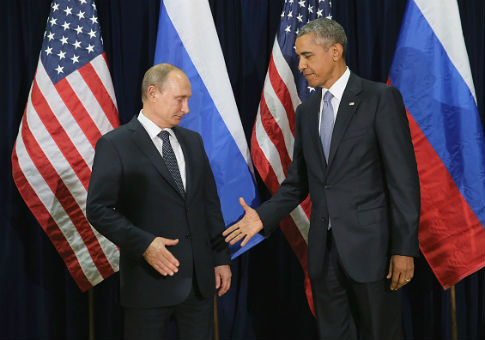U.S. intelligence officials were frustrated with the Obama administration's response to Russia's cyber espionage and disinformation campaigns to disrupt Western democracies, arguing the administration's reluctance to respond more forcefully stemmed from fear of Russian retaliation.
More than a dozen current and former national security officials from across the government told Politico how ineffective the White House and key agencies were in authorizing counter measures against Russian interference. Those officials said that responses such as shutting down suspected Russian intelligence sites or taking counter-intelligence action never went anywhere due to administrative roadblocks.
"[Intelligence officials] had a list of things they could never get the signoffs on," one official said. "The truth is, nobody wanted to piss off the Russians."
Wanting to counter suspected Russian interference in American politics, these officials said that the Obama administration was aware of Russia's activities but did not want to retaliate forcefully. As it became clear that Russia was meddling in the 2016 election, officials recommended expelling diplomats or striking back through cyber measures but were denied.
Some outside the White House blamed the National Security Council's micromanagement, but NSC officials pointed the finger at the State and Defense Departments. Those agencies were reportedly afraid of Russian retaliation.
"The frustrations [about lack of forceful action] are justified and, frankly, were shared by the White House," a former official told Politico. "The options were being discussed. They weren't being implemented."
The Obama administration as early as 2014 received several warnings that Moscow was intensifying its intelligence operations to disrupt the U.S. political system and other Western democracies, Politico reported Monday, citing more than half a dozen current and former officials. The NSC, intelligence agencies, and the State Department received reports of Russia stepping up its operations after the Kremlin's cyber attack against Ukrainian election systems in 2014.
To some government officials, the administration was too dismissive that Russia posed a threat to the U.S.
"Even if the Russians and [Russian President Vladimir] Putin had these ambitions, they were doubtful of their capacity to execute them," one official said of the Obama administration.
Others were concerned about the prospect of Russia testing the U.S.
"We were worried [Putin] would try to test us," a former Obama administration official said. Another official described the reports of Russian plans as "alarming," adding that they were "extraordinary about the extent of the threat and the capacities the Russians were building."
Ned Price, a former spokesman for the NSC under Obama, denied that the White House was reluctant to act and feared retaliation from Putin.
"The Obama administration was nothing but proactive in responding to Russian aggression in all of its forms, especially as Moscow became more brazen with and following its military moves against Ukraine beginning in 2014," Price said, referring to sanctions and support for NATO.
In the summer of 2016, the administration considered doing even more, assembling a list of options but ultimately choosing inaction. One former NSC official blamed the lack of a response on pushback from several national security agencies that feared retaliation.
"Any of these actions risked a Russian reciprocation," the former official said. "We were kind of caught in a catch-22."
